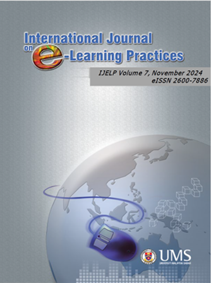THE EFFECTS OF USING DIGITAL VOCABULARY JOURNAL IN MUET WRITING PERFORMANCE AMONG PRE-UNIVERSITY STUDENTS: AN ACTION RESEARCH
DOI:
https://doi.org/10.51200/ijelp.v7i1.5564Keywords:
action research, digital vocabulary journal, writing performance, MUET, pre-university studentsAbstract
In learning English as a second language, the importance of vocabulary competency has long been recognized for its significance. An area where vocabulary knowledge has demonstrated significant promise is in the realm of writing as the breadth and depth of students’ vocabulary are reflected in the general quality of their writing. Hence, the introduction of vocabulary journal is essential as it has been used to create interactive and immersive learning experiences that help learners acquire and retain new words more effectively. This classroom-based action research investigated the impacts of keeping digital vocabulary journal towards writing performance of ten pre-university students in a pre-university center in Sabah. It sought to to find out whether there is any difference in the students’ writing scores prior to and after keeping vocabulary journal as well as to assess the students' attitudes toward maintaining a digital vocabulary journal. This action research used a mixed-method approach. Pre-test and post-test writing scores comprised the study's quantitative component, while the qualitative approach used semi-structured interviews and product analysis. The results indicated significant difference with large effect size and positive students’ attitudes towards digital vocabulary journal. As a result, the assertions regarding the advantages of digital vocabulary journals were empirically supported by this action research study. By engaging in this type of research, teachers can gain valuable insights into how to optimize their use of digital vocabulary journal in the classroom, and ultimately improve the effectiveness of their teaching practice.
References
Alqahtani, M. (2015). The Importance of Vocabulary in Language Learning and How to Be Taught. International Journal of Teaching and Education, III, 21-34.
Asyiah, D. (2017). The vocabulary teaching and vocabulary learning: Perception, strategies, and influences on students’ vocabulary mastery. Jurnal Bahasa Lingua Scientia, 9(2), 293-318.
Benson, P. (2003). Learner autonomy in the classroom. In D. Nunan (Ed.) Practical English language teaching. PRC: Higher education press/McGraw Hill.
Blachowicz, C. L. Z., & Fisher, P. J. L. (2000). Vocabulary Instruction. In M.C. Kamil, P. B. Mosenthal, & R. Barr (Eds.), Handbook of reading research, 3, 503–523.
Chong, J.W.T., & Kee, L.L. (2019). Using vocabulary journals to improve vocabulary learning among primary school pupils in Malaysia. Journal of English Education, 4(2), 108-120.
Corona, C., Spangenberger, S. & Venet, I. (1998). Improving Student Writing through a Language Rich Environment. M.A. Action Research Project, St. Xavier University and IRI/Skylight, 61 pages.
Fowle, C. (2002). Vocabulary notebooks: Implementation and Outcomes. English Language Teaching Journal, 56(4), 380-388.
Jambari, O., Khaerina, R., Siswanto, P., Nugroho, A.S., Neha, B.M., Nurhayati, N., & Cahyono, H. (2021). The correlation between students’ vocabulary mastery and students’ speaking skill. Advances in Social Science, Education and Humanities Research, 535, 102-104.
Lai, Y.C. (2013). Enhancing Vocabulary Acquisition in the Language Classroom Using Vocabulary Notebooks. NCUE Journal of Humanities, 8, 17-38.
Lewis, M. (2000). Teaching collocation. London: Thomson Heinle.
McCrostie, J. (2007). Examining learner vocabulary notebooks. ELT Journal, 61(3), 246-255.
Nation, I.S.P. (1990). Teaching and learning vocabulary. New York: Newbury House.
Nor, K.M,, Razali, M.M., Talib, N., Ahmad, N., Sakarji, S.R., Saferdin, W.A.A.W.M., & Nor, A.M. (2019). Students’ problem in learning English as a second language among MDAB students at UITM Malacca. International Journal of Humanities, Philosophy, and Language, 2(7), 1-12.
Oxford, R.L. (1990). Language learning strategies: what every teacher should know. Boston, MA: Newbury House.
Pinter, A. (2006). Teaching young language learners. Oxford: Oxford University Press
Schmitt, N. (2000). Vocabulary learning strategies. Vocabulary: description, acquisition and pedagogy. Cambridge: Cambridge University Press (pp. 199-228).
Santillan, J.P. & Daenos, R.G. (2020). Vocabulary knowledge and learning strategies of senior high school students. Universal Journal of Educational Research 8(6), 2474-2482.
Susanto, A. (2017). The Teaching of Vocabulary: A Perspective. Jurnal KATA, 1(182).
Turnuk, T. (2018). The effects of implementing vocabulary journals into main course classes on student success at a private university. Journal of English Teaching, 4(3), 183-194.
Uzun, L. (2013). Promoting vocabulary learning through vocabulary notebooks: Teaching and learning strategies and gender. Journal of Academic Language Learning and Teaching, 1.






